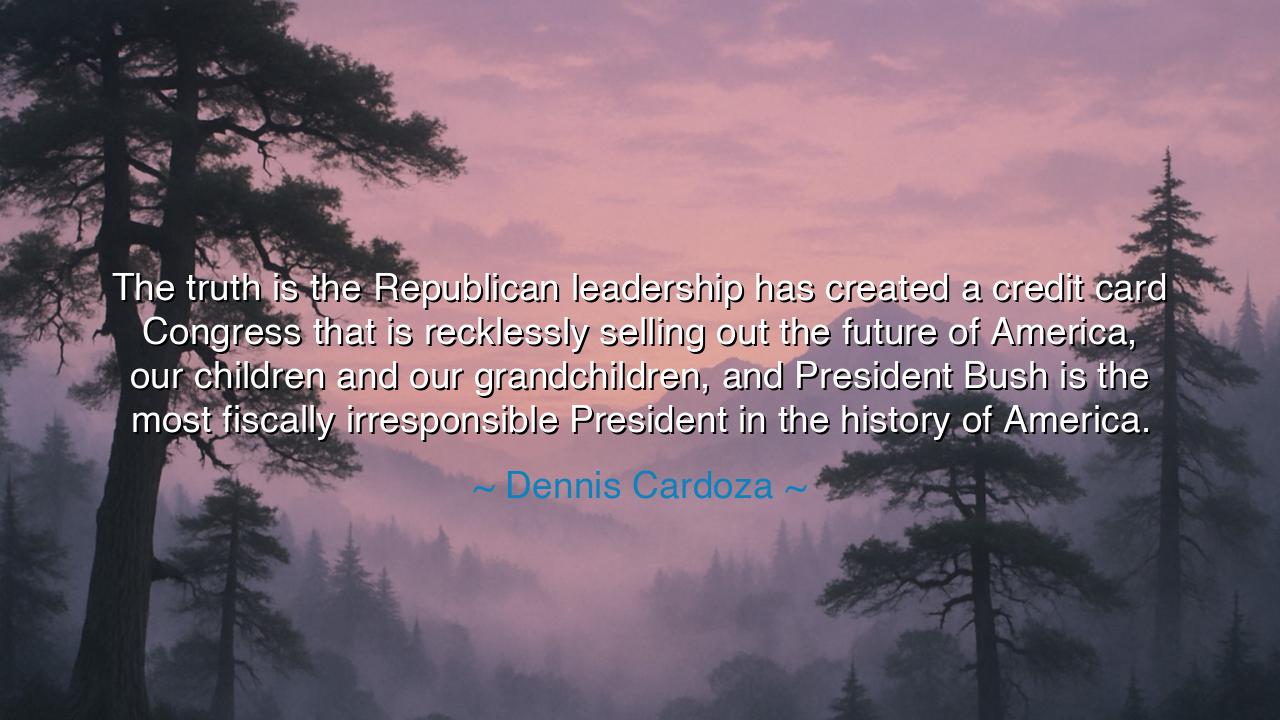
The truth is the Republican leadership has created a credit card
The truth is the Republican leadership has created a credit card Congress that is recklessly selling out the future of America, our children and our grandchildren, and President Bush is the most fiscally irresponsible President in the history of America.






In the fiery words of Dennis Cardoza, we hear a voice not merely of politics, but of warning — a warning born from the ancient rhythm of cause and consequence that governs both empires and men. “The truth is the Republican leadership has created a credit card Congress that is recklessly selling out the future of America, our children and our grandchildren, and President Bush is the most fiscally irresponsible President in the history of America.” Beneath the heat of these words lies a timeless truth: that when leaders abandon prudence for convenience, when they spend tomorrow’s strength to feed today’s comfort, they betray the covenant between generations. For Cardoza speaks not just of debts counted in dollars, but of a deeper moral debt — the betrayal of stewardship, the breaking of trust between the living and the yet unborn.
To understand the origin of this quote, we must return to the early years of the twenty-first century, when the United States, under President George W. Bush, stood amid war, tax cuts, and rising deficits. The government spent lavishly while revenues declined, and the national debt began to soar. Cardoza, a congressman from California and a centrist voice within the Democratic Party, looked upon this imbalance and saw not just mismanagement, but moral failure. His metaphor of a “credit card Congress” was no mere insult; it was a portrait of a system that had traded foresight for indulgence. Like a household living far beyond its means, America’s government, he warned, was mortgaging its own destiny — placing the burden upon its children and grandchildren, who would inherit the interest of decisions they never made.
This truth echoes through the ages. For history is filled with nations that mistook excess for prosperity, and borrowed their way into ruin. The Roman Empire, in its final centuries, spent more than it could sustain — on wars, luxuries, and vanity — until its coffers were empty and its strength consumed. The emperors taxed the poor, devalued their coinage, and borrowed against the promise of tomorrow, until tomorrow itself collapsed. Cardoza’s warning, though uttered in the halls of Congress, is thus as old as civilization: when a people forget moderation, when their leaders feed them illusions of endless plenty, decline soon follows. The burden of debt is not only financial — it is spiritual, for it corrodes the discipline and restraint upon which all enduring greatness is built.
Cardoza’s words also remind us that leadership is not measured by generosity with other people’s money, but by courage to say “enough.” The easy path of governance is to give — to fund every demand, to promise every comfort — but the noble path is to guard the balance between compassion and responsibility. For even virtue, when purchased through debt, becomes corruption. A wise ruler, as the ancients knew, is a steward, not a spender — one who plants trees under whose shade he will never sit, one who preserves the inheritance of the nation so that future generations may build upon it. In calling out “fiscal irresponsibility,” Cardoza is not merely condemning policy; he is invoking this eternal standard of leadership: to live and govern with an eye toward the horizon, not the next election.
Consider the story of Solon of Athens, the great lawgiver who saw his city crippled by debt and inequality. He could have pleased the powerful by allowing the debts to remain; he could have pleased the poor by erasing them without order. But instead, he forged the Seisachtheia, the “shaking off of burdens,” restructuring the debt while restoring justice. In doing so, he preserved both the economy and the soul of Athens. Solon understood, as Cardoza reminds us, that debt — whether public or private — is not only a question of economics, but of ethics. It measures how a society honors its obligations, how it restrains its appetites, and how it values the balance between freedom and responsibility.
The meaning of Cardoza’s warning extends beyond party or president. It is a parable for every generation tempted to live beyond its limits. For when a nation’s citizens demand comfort without contribution, and leaders indulge them with promises funded by unseen debt, the cycle of decline begins. What he calls the “credit card Congress” is but a reflection of a deeper human weakness — the desire to take without giving, to enjoy without earning. Yet, as all ancient teachers have said, no debt remains unpaid. Whether in wealth or in character, what is borrowed must one day be restored.
The lesson of these words, therefore, is both practical and moral: prudence is the guardian of freedom. We must each live, as individuals and as nations, within the bounds of wisdom. To build without debt of conscience, to leave behind more than we consume, to act not only for the present but for those who will follow — these are the duties of the virtuous and the wise. Leaders must be caretakers, not consumers, of the future; and citizens must demand not comfort, but integrity.
So, let us heed Cardoza’s cry not as partisan scorn, but as ancient counsel reborn: do not sell the future for the ease of today. For every coin spent in folly is borrowed from our children’s peace; every act of recklessness echoes through generations. Let us therefore live and govern as the ancients taught — with balance, foresight, and reverence for the yet unborn. For the wealth of a nation is not its treasury, but its conscience; and once that is spent, no empire, however mighty, can ever buy it back.






AAdministratorAdministrator
Welcome, honored guests. Please leave a comment, we will respond soon